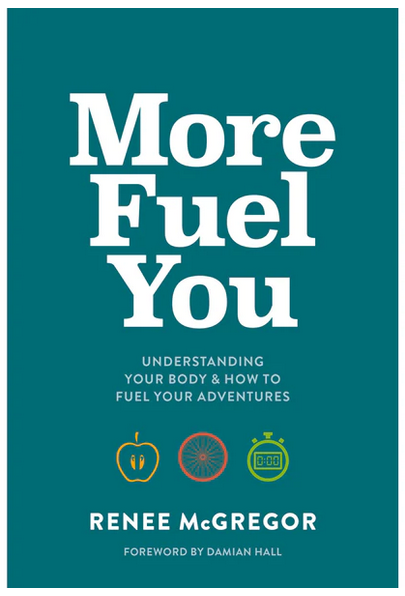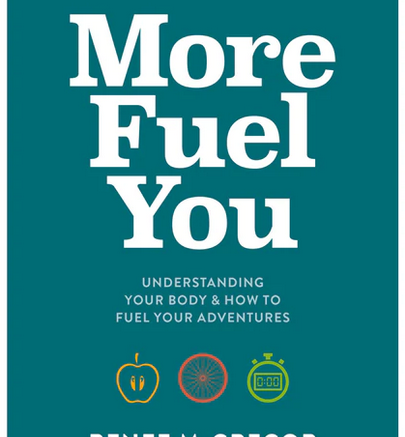Many of the non-fiction books I’ve read recently have all been around people achieving great things with their running. With all the life stories involved there’s detail about the achievements and the work behind them. What tends to get less coverage is nutrition, yet this is one aspect that as athletes we can all benefit from learning about.
So when Vertibrate Publishing asked whether I would be interested in reading and reviewing Renee McGregor’s latest book, “More Fuel You” it certainly piqued my interest. For disclosure, the publisher has provided me the book so that I can give a review about it, but all the words and opinions in this piece are mine.
About the Author
Renee McGregor is a sports nutritionist and over the past 20 years has worked with a whole slew of athletes, from runners at her local club through to members of team GB’s Olympic and Paralympic teams. As a clinician she has worked with people with a whole range of issues relating to nutrition and focuses her attention on scientific literature, control studies and observational data to forward her knowledge in the field of sports nutrition. She has written a number of books and is a keen runner herself.
More Fuel You
McGregor has set the book out into two main sections. The first section covers “fueling for training and competition purposes” in a relatively general way to cover all athletes, by which she means anyone partaking in any form of exercise.
General points about nutrition
Not only does she talk about the importance of effectively fueling the body for this purpose, she highlights that the nutrition needs to cover all the standard metabolic functions to lead a healthy life and in particular the problems that can arise when the fueling is inappropriate or insufficient. Whilst the text is very scientific (complete with links back to the research papers used), it is presented in a clear and easy-to-read format.
Introduced in the very first chapter, the condition of Reduced Energy Deficiency in Sport, or RED-S is covered in detail throughout the book. This is a serious condition that is brought on with inadequate nutrition. I was already very aware of RED-S, but the book really brought it home just how easily it can occur, and that it’s not always as easy to spot as you might imagine.
Nutrition strategies
Towards the end of part one, McGregor then considers a number of “popular” nutrition strategies. By which is meant the approaches that are all over the social media channels and with celebratory endorsements which “validate” them as “appropriate”.
However instead of preaching about whether or not said strategy has any merit, McGregor talks through the supposed “theory” behind each approach and provides a critical view on the pros and cons of each, based on the research that has actually been done. Backing up these different strategies are a number of case studies which have been written by the athletes themselves, followed by the author highlighting the important points to note. In particular, she reminds the reader that all athletes are different and thus what works for one person may really not work for another.
Nutrition for specific groups
The second half of the book focuses on “fueling for specific populations” and it was this section that I was particularly interested in. I know the basics about nutrition, but definitely not as much as I should, and as a running coach myself, this is definitely an area that I feel I need to have a better appreciation of. But this information is important to the individual as well to help understand how they can ensure their nutrition is appropriate.
The first ‘population’ covered was “the female athlete” and the author went into plenty of detail about considerations about women’s health and how this can impact on their training (be it for a recreational run or an Olympic final).
It’s not a static thing either and just as every athlete is different, each one with have different needs at different points in their lives. A pertinent observation made by the author is the sheer lack of scientific data on some of the groups e.g. post-menopausal athletes which in itself highlights the concern where a celebratory endorsement of a particular strategy can be confused and interpreted into being a scientifically proven fact through the power of social media.
The book then continued on with “the masters athlete” which is essentially anyone training above the age of 35. McGregor highlights that whilst studies have been taken of masters athletes, they tend to be mostly based on caucasion male athletes, further highlighting the limitations of scientific data at this time.
The final two chapters of the book then look to focus on the individual. Ever human is different, both biologically and socially such that whilst general trends can be observed across a population, the individual circumstances can play a much bigger role.
In summary
There’s not been many books I’ve read where I find myself talking to other runners about it, but this is definitely one of those case!
The book will not tell you exactly what you should or shouldn’t eat, and that’s sort of the point. It will however give you the background to understand what you need to consider to ensure your nutrition is appropriate and to help cut through some of the social-media trends about food.
A highly recommended read, really good!
You can get hold of “More Fuel You” by Renee McGregor from the publisher’s website.



Be the first to comment on "More Fuel You (Renee McGregor) – book review"